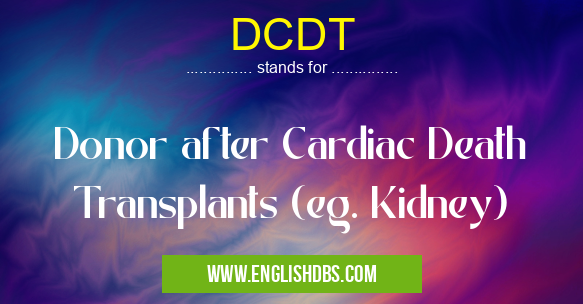What does DCDT mean in SURGICAL
DCDT, which stands for Donor after Cardiac Death Transplants, refers to a specific type of organ transplantation where organs are harvested from donors who have experienced cardiac arrest (heart stoppage) and have been declared legally dead. This process involves transplanting organs such as kidneys, lungs, livers, and hearts from these donors to patients in need. DCDT is a relatively new approach in organ transplantation, with the first successful DCDT transplant performed in 1995.

DCDT meaning in Surgical in Medical
DCDT mostly used in an acronym Surgical in Category Medical that means Donor after Cardiac Death Transplants (eg. Kidney)
Shorthand: DCDT,
Full Form: Donor after Cardiac Death Transplants (eg. Kidney)
For more information of "Donor after Cardiac Death Transplants (eg. Kidney)", see the section below.
Key Aspects of DCDT
-
Organ Procurement: Organs for DCDT are typically procured from individuals who have suffered irreversible cardiac arrest and cannot be resuscitated. The organs are retrieved after obtaining informed consent from the donor's family or legal guardians.
-
Donor Criteria: Donors for DCDT are carefully selected based on specific criteria, including age, medical history, and the condition of the organs. Donors are typically younger than 55 years of age and have a relatively healthy lifestyle.
-
Recipient Selection: Patients who are eligible for DCDT are those who are critically ill and in need of organ transplantation. The selection process involves evaluating the patient's medical condition, compatibility with the donor's organs, and overall prognosis.
-
Surgical Procedure: The surgical procedure for DCDT is similar to that of other organ transplantation procedures. However, due to the donor's cardiac arrest history, additional steps are taken to ensure the viability of the organs.
-
Post-Transplant Care: Patients who receive DCDT organs require close monitoring and intensive post-transplant care to manage any potential complications. This may include immunosuppression therapy to prevent organ rejection and regular follow-up appointments to monitor organ function and overall health.
Advantages of DCDT
-
Increased Organ Availability: DCDT expands the donor pool for organ transplantation, offering hope to patients who may otherwise face prolonged waiting times.
-
Improved Organ Quality: Organs from DCDT donors are often of good quality, as they are procured from relatively young and healthy individuals.
-
Ethical Considerations: DCDT adheres to ethical principles by ensuring that organs are only retrieved from donors who have been legally declared dead and with the consent of their families.
Essential Questions and Answers on Donor after Cardiac Death Transplants (eg. Kidney) in "MEDICAL»SURGICAL"
What is Donor after Cardiac Death (DCD) Transplantation?
DCD transplantation refers to the use of organs from donors whose hearts have stopped beating (cardiac death) but have been successfully revived through cardiopulmonary resuscitation (CPR).
What types of organs can be transplanted from DCD donors?
Typically, DCD donors are used for kidney transplantation, although in some cases, other organs such as the liver and pancreas may be considered.
How does DCD transplantation differ from traditional organ transplantation?
In traditional transplantation, organs are retrieved from donors who have suffered irreversible brain death but whose hearts are still beating. In DCD transplantation, organs are retrieved from donors after their hearts have stopped beating. This requires the use of specific preservation techniques to ensure the viability of the organs.
What are the benefits of DCD transplantation?
DCD transplantation expands the donor pool, potentially reducing waiting times for patients in need of transplants. Additionally, DCD organs may be more resilient to ischemia-reperfusion injury, which can occur when organs are deprived of oxygen during the transplantation process.
What are the risks associated with DCD transplantation?
DCD transplantation carries a higher risk of complications compared to traditional transplantation. These risks include delayed graft function, rejection, and infection. The use of DCD organs may also lead to a shorter lifespan of the transplanted organ.
Who is a suitable candidate for DCD transplantation?
DCD transplantation may be considered for patients who are in urgent need of a transplant and have a high risk of dying while waiting for a traditional donor. Informed consent is required from the patient's family or legal guardian before DCD transplantation is performed.
Final Words: DCDT is a valuable approach in organ transplantation that has the potential to save and improve the lives of critically ill patients. By utilizing organs from donors who have experienced cardiac arrest, DCDT increases the availability of organs and offers hope to those in need. It is essential to balance the ethical considerations, careful donor selection, and meticulous surgical procedures to ensure successful outcomes and patient well-being in DCDT.
